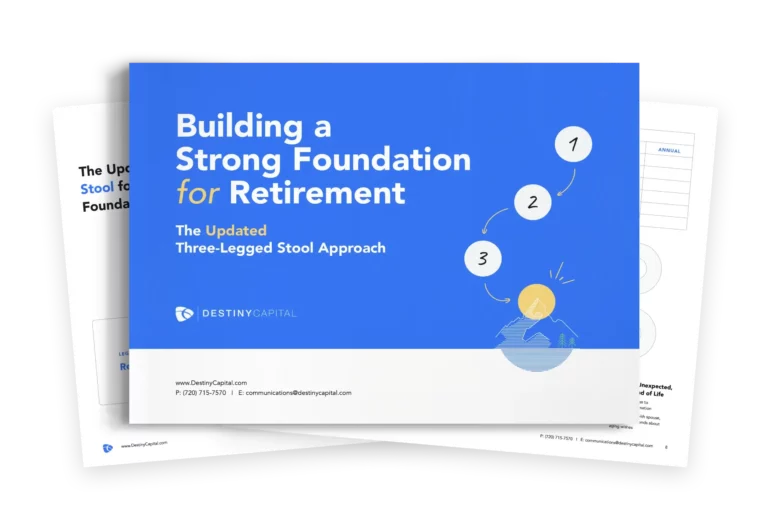
Frequently Asked Questions of ESG Investing
While Environment, Social and Governance (ESG) investing may be well known among some wealth management industry insiders, it is a strategy that is still somewhat new to the investing public (and even many financial advisors). At Destiny Capital, we believe that it is vital to educate our clients and partners, so we’ve constructed these Frequently Asked Questions of ESG Investing in an effort to enhance transparency and create informed, confident investors.
What is ESG investing?
Let’s start with the basics. At its core, ESG investing is about determining risks and identifying opportunities related to key environmental, social and governance issues that may impact shareholder value. These issues may include the following topics:
- Environment – carbon emissions, toxic waste, water usage and clean air/water/land
- Social – worker safety, human rights, gender pay equality, customer privacy and data security
- Governance – board structure, board diversity, shareholder rights, supply chain risk and executive compensation
As you can see based on the topics above, ESG investing not only focuses on shareholders, but also considers stakeholders. In addition to shareholders, stakeholders may include a company’s employees, their customers, their communities and the environment.
Ultimately, ESG investing isn’t about reinventing the wheel. It’s about refining it. ESG stock analysts and researchers incorporate important ESG data alongside traditional fundamental analysis when making critical buy/sell decisions.
ESG investing also allows the individual investor to elevate their voice and advocate for positive change at the corporate level. This is primarily accomplished through proxy voting, where an investor may support or oppose various initiatives that impact ESG issues such as executive compensation, shareholder rights, worker rights, data disclosure/transparency and corporate carbon footprint, to name just a few.
Does ESG investing sacrifice investment performance?
The biggest misconception among the investing public and many advisors is that ESG strategies support certain issues at the expense of investment returns. This is a complete misrepresentation of what ESG investing is all about. In reality, ESG investing strategies are intended to enhance risk-adjusted returns while potentially reducing overall portfolio volatility.
ESG investing analyzes key risks that may impact shareholder value and identifies which companies and/or industries may be the winners and losers as, for example, the world economy adjusts to combat the impacts of climate change.
In short, Destiny Capital believes that if investors aren’t incorporating ESG data into their research, then they aren’t doing their full due diligence.
As an investor, can I impact every issue that’s important to me through ESG investing?
Now more than ever, investors have the opportunity to align investment strategies with their closely held values without sacrificing returns. However, it’s important to note that not all issues can be addressed through investing alone.
The impact created through ESG investing is real, and we’ve witnessed it in the evolution of corporate behavior and decision-making in recent years as, among other things, large, multinational corporations proactively commit to a carbon-neutral presence.
However, investors may be interested in more targeted issues or values that may or may not be effectively impacted through investing alone. Examples of this may include faith-based initiatives, the support of local education systems, fighting world hunger or combating disease in third world countries. In cases like this, investors may make a greater impact through charitable donations, a Donor Advised Fund (DAF), volunteerism, philanthropy or a specific, targeted investment.
Regardless, at Destiny Capital, we believe that it is important for advisors to have ongoing values conversations with clients to see if and/or how we can align investing strategies with their closely-held values in order to help them find meaning in money.
What are some examples of ESG in action?
Below are two instances of ESG in action that the investing public may be very familiar with:
Equifax – According to ESG data provider MSCI, Equifax had its sector’s worst Data Privacy & Security score. This was prior to the massive data breach that affected hundreds of millions of people and caused an immediate and steep sell-off of Equifax stock and irreparable reputation damage. Without ESG research, an investor may be blind to this material Data Privacy & Security risk.
PG&E – Traditionally, utility companies have been viewed as relatively conservative investments that pay a high dividend with low price volatility. In 2018, the horrific Camp Fire was caused by Pacific Gas and Electric’s (PG&E) infrastructure throughout California, resulting in a tragic loss of life and property and bankruptcy proceedings for PG&E.
Would you invest in any utility across the country without considering the environmental risks associated with that utility company’s infrastructure? Traditional investment research may not incorporate these environmental risks into a buy/sell decision, ignoring a considerable hazard and potentially jeopardizing long-term shareholder value.
How is impact measured in an ESG portfolio?
This is a critical consideration when implementing any ESG strategy. Is a strategy considered ESG in name only, or does it provide an investor with examples of concrete, measurable impact?
There are some investment managers who make examples of fund-level impact available on fund fact sheets or through their websites. For example, Calvert Research & Management – the fund family that Destiny Capital utilizes in implementing our Sustainable Impact Strategies – provides an Impact Tool on their website that illustrates environmental impact relative to a fund’s underlying index.
An example of this might be a statement like, “A $50,000 investment in the XYZ fund results in 74% lower carbon emissions than the Russell 1000 Index. This is the equivalent to the carbon emissions of 790 gallons of gasoline.” Tools like this help an investor to quantify the real-world impact of their investing dollars.
Furthermore, effective ESG fund managers should provide ESG Investing Principles that must be adhered to when making investment selections. These Principles should demonstrate a commitment to identifying and supporting key ESG issues before an investment is made.
An investor should also have an understanding of Exclusions, which identify behaviors or characteristics that preclude an investment, such as human rights violations, poor records of environmental stewardship or actions that negatively impact shareholder rights, to name a few.
Finally, an investor, or their advisor, should have an understanding of a fund manager’s proxy voting guidelines and their proxy voting record. Proxy voting is defined in the following question.
Detailed proxy voting guidelines should outline how a fund manager will vote on key ESG issues, while a fund’s proxy voting record should demonstrate an active voting record that adheres to the fund’s specific voting guidelines.
What is Proxy Voting and what role does it play in ESG investing?
Proxy voting is an absolutely essential piece of any effective ESG investing strategy. When investing in vehicles like mutual funds or exchange traded funds (ETFs), it can be easy to lose sight of the fact that stock investing equates to ownership. Stock owners have a voice, and their voice is most effectively heard through voting on key issues during a corporation’s annual meeting.
In a mutual fund structure, the fund itself owns the shares of stock, and should actively vote on behalf of fund investors. For example, the XYZ ESG Growth Fund may own 250,000 shares of a company’s outstanding stock, and the fund can leverage these shares on behalf of individual investors when casting votes. These votes may impact crucial decisions related to key topics like shareholder rights, appropriate executive compensation, board diversity, gender pay equality, the environmental impact of business practices, data disclosure, worker safety and human rights, among many others.
Quality ESG fund managers should provide an investor with detailed Proxy Voting Guidelines that outline how the fund will vote on an investor’s behalf on all key ESG issues. The fund should then provide proof of their proxy voting record and how they voted on these key issues over the course of each year.
This ensures that – as an investor – your voice is heard, and your ESG investments actively vote on your behalf to advocate for positive change.
Does having women in corporate leadership roles impact financial performance?
Anecdotally, as Chief Investment Officer, I am part of a corporate leadership team that consists of four women and two men (including myself). I can say unequivocally that our team makes better and more nuanced decisions due to gender-diverse perspectives. This begs the question, “Do I just happen to be lucky to work with brilliant, insightful women who add tremendous value to our organization and its leadership?” The financial impact of gender diversity in corporate leadership can be difficult to quantify, which is why we’ve seen new research that focuses specifically on this issue.
A study by financial research and data provider MSCI conducted between 2011-2016 found that companies with at least three women on the board of directors experienced median gains in Return on Equity (ROE) of 10% and Earnings Per Share (EPS) of 37%. Conversely, companies that began the period with no female directors experienced median changes of -1% in ROE and -8% in EPS over the same study timeframe.
Clearly, causality is difficult to prove in cases like this, but we expect to see a continued focus on studies that seek to explain the financial effect of gender-diverse perspectives in corporate leadership.
What is ‘Greenwashing’ and how can I avoid it?
Greenwashing is a term that is related to product labeling standards, which are not heavily regulated or monitored in the ESG investing world – for now. Greenwashing occurs when, for example, a mutual fund or ETF calls itself “The XYZ Large Cap Core ESG Fund” when all it does is exclude broad sectors like Energy or the big tobacco companies.
In a fund like this, there is no true inclusionary ESG research being done. They are simply excluding certain companies or broad industries and then labeling their fund as ‘ESG’ to generate interest and drive asset flows into the fund.
It is the role of a financial advisor and their team to identify instances of greenwashing in order to protect investors from deceptive product labeling practices.
Do ESG strategies have higher expense ratios?
ESG investing is about identifying risks and exploring opportunities related to environmental, social and governance issues that may impact shareholder value. As with any investment, it’s important to consider cost and to recognize whether or not a certain fund, strategy or product is worth its underlying expense.
In the case of ESG strategies, we believe that active ESG fund management provides tremendous value. As illustrated throughout these FAQs, effective ESG strategies are comprehensive, labor intensive and are intended to provide strong, risk-adjusted returns with the potential to reduce overall volatility. With the right investment managers, ESG investors get all of the benefits of ESG research and stock selection and also have their voices heard through ongoing proxy voting and other shareholder advocacy efforts.
Respected and effective fund managers also have a seat at the table, and they can directly engage with key corporate decision-makers to advocate for positive change related to key ESG issues.
Generally speaking, we’ve seen fund management expenses condense significantly over the past five to ten years. Management fees for ESG strategies are no different. Five or ten years ago, an ESG fund that had internal expenses of 1.75% – 2.50% might now be .25% – 1.00%. Through innovation, efficiency and competition, we expect to see costs continue to condense, although perhaps not quite as precipitously as in recent years.
Through ESG investing, we hope that investors will experience impact not only in reaching their personal financial goals, but in facilitating positive change related to key environmental, social and governance issues.
How does Destiny Capital construct ESG portfolios?
As we’ve indicated previously, ESG investing isn’t about reinventing the wheel. It’s about refining it. We believe that ESG research is a key innovation that has the potential to provide tremendous value for investors and other key stakeholders.
At Destiny Capital, we see ESG investing as a vital enhancement to our current portfolio management process. Our core investing principles include words and phrases like “data-driven”, “diversified”, “disciplined” and “innovative”, to name a few. Using our data-driven process, we analyze the risk/return profile of every asset class in the investable universe. Utilizing this data, we then construct diversified and customized portfolios that include exposure to key asset classes that we believe have the potential to provide investors with the strongest returns based on their tolerance for risk and volatility.
Historically, Destiny Capital has utilized low-cost and efficient passive funds to gain exposure to key asset classes such as Domestic Large/Mid/Small Cap Equities, International Equities, Emerging Market Equities, Investment Grade Bonds, High Yield Bonds, Treasuries, Commodities and Real Estate. However, in keeping with our core principle of Innovation, our extensive research has shown that investments that incorporate ESG research have the potential to enhance risk-adjusted returns relative to these passive strategies.
Therefore, we’ve created our Sustainable Impact Strategies and partnered with venerated ESG investing pioneer Calvert Research & Management in executing our vision. Through Calvert, we not only benefit from their decades of experience in ESG investing, but also through their dedicated commitment to proxy voting, shareholder engagement and advocacy.
How do I get started investing in Destiny Capital’s Sustainable Impact Strategies?
Please click here or call 303.277.9977 to be connected with one of our Wealth Strategists for a free, initial consultation.
Important note and disclosure: This article is intended to be informational in nature; it should not be used as the basis for investment decisions. You should seek the advice of an investment professional who understands your particular situation before making any decisions. Investments are subject to risks, including loss of principal. Past returns are not indicative of future results.




